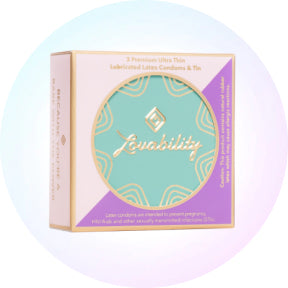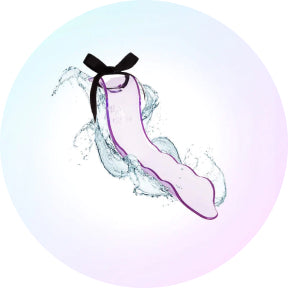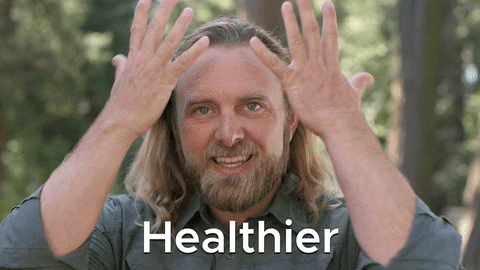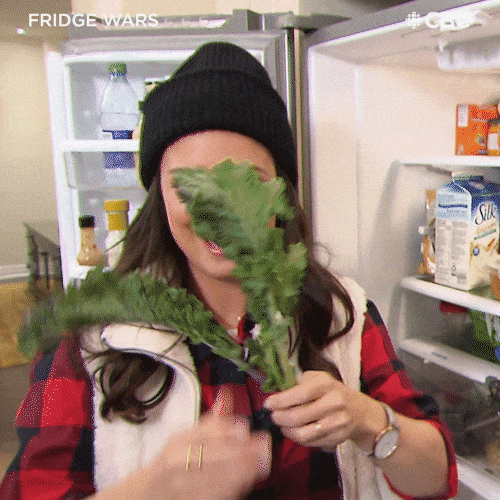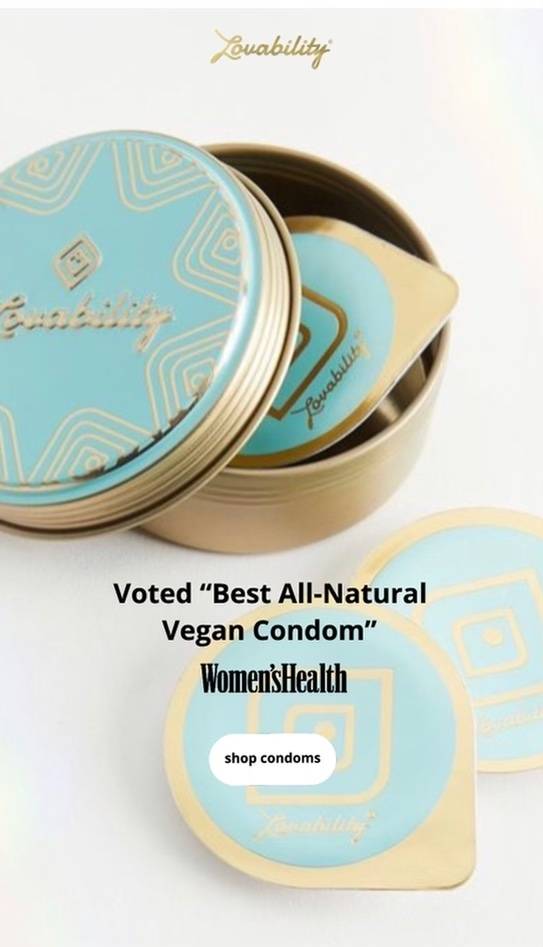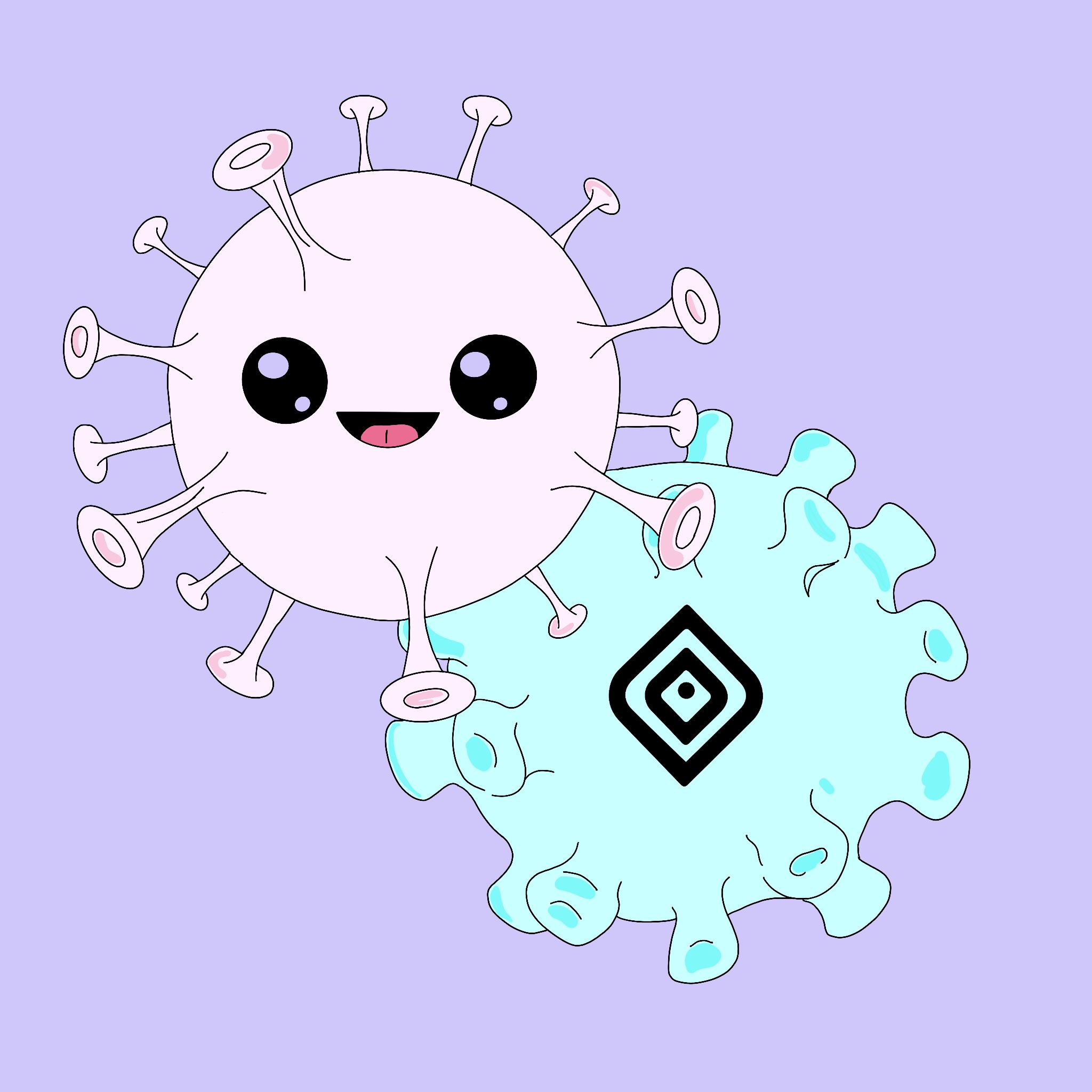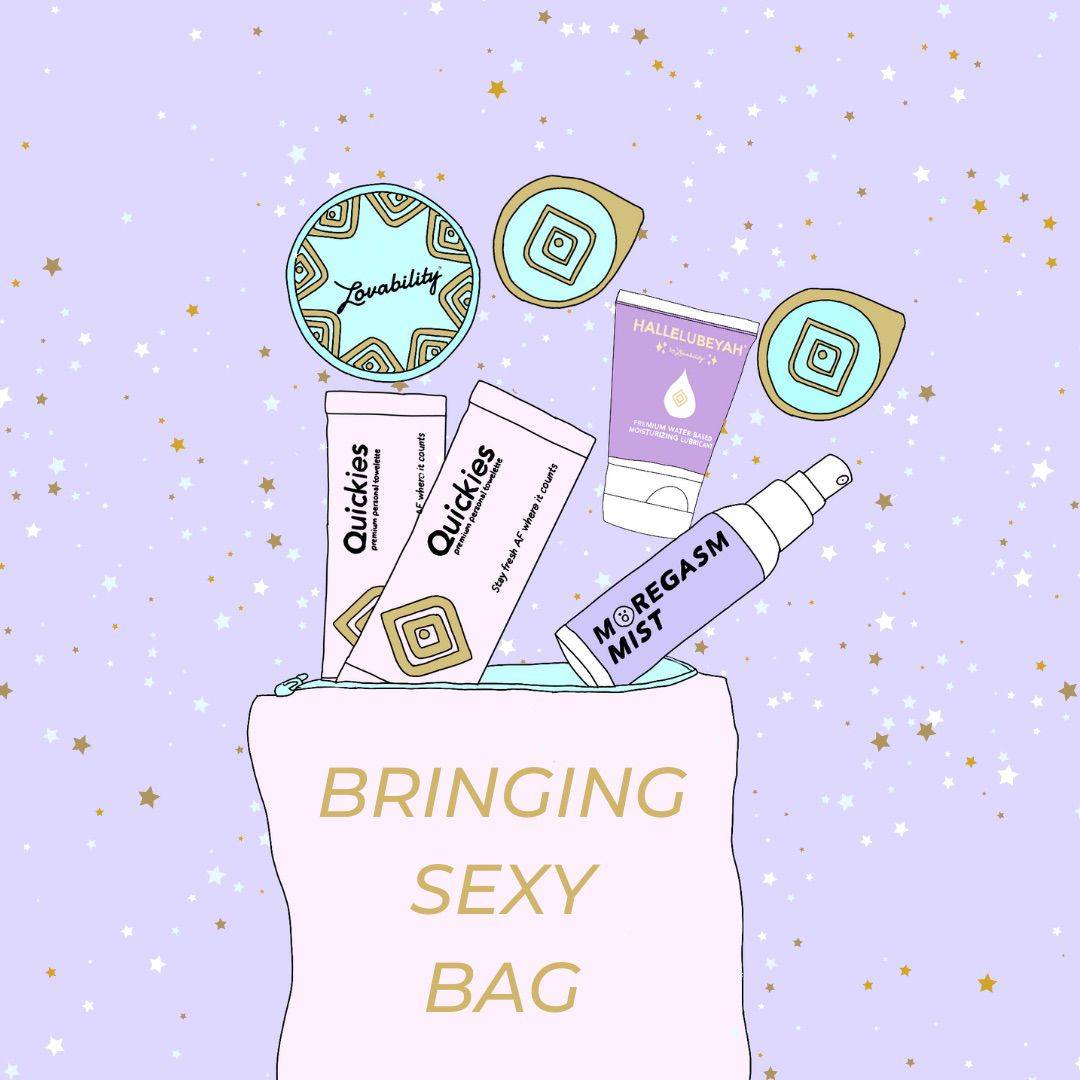Being safe in the bedroom means more than just asking for consent and choosing a respectful partner (though those things are mega crucial too). What you use during sexy time - from the condom and personal lubricant to the massage candle and the pleasure device - is just as important.
Many sex essentials and toy products that come into contact with your nether regions contain harsh ingredients or materials that can throw off your delicate balance and irritate your skin. The potential for mood-killing is high enough to send most people down the rabbit hole of "healthy" alternatives.
Terms like "natural," "clean," and "toxin-free," sound great, but they're often vague, unregulated, and sometimes completely unrelated to the nature of the product itself. You shouldn't have to be a chemist to pick out a good lube, arousal balm, or sex toy, so we're peeling back the curtain on what some of these so-called healthy labels really mean.
Can We Trust Labels?

In theory, labels are supposed to give us consumers insight into what we're buying and using. But there's no shortage of words and terms companies use to make their products sound healthier, safer, or more environmentally friendly that don't always have meaning.
Taking responsibility for your sexual health and wellness means not blindly trusting marketing buzzwords on a label and doing a little more diligence. The more you know about what goes into your products, the more confident you can be about using them.
What Does It Mean When A Product Is Marketed As "Natural"?

The FDA currently has no formal definition for "natural" but they have suggested that it "means that nothing artificial or synthetic." Of course, this mainly applies to food—not condoms, personal lubricant, or vibrators.
In the context of sex, "natural" should mean the product is made with plant-based or mineral ingredients as opposed to chemicals. A good rule of thumb is to see if you can recognize the ingredients on the list. If you can't pronounce it or have never heard of it before, it's probably not natural.
Still, the word "natural" is kind of a benign term that companies use to make their products sound healthy. So even if a product is marketed as "natural," more research is usually needed to see if the ingredients are actually safe for your body.
Does Body-Safe Mean It Is Safe For Your Body?

The term "body-safe" is used a lot in the toy industry to describe products made without sketchy materials that leach toxins and irritate your skin (gross, right?). Body-safe products are non-porous and smooth, so they don't harbor bacteria the way something non-safe can.
While the label itself can be helpful and reassuring, it's important to note that there is no legal definition of "body-safe" by the FDA. Just because a product is marketed as safe doesn't necessarily mean that it is.
The best way to tell if a product gets the green light in safety is to check the materials. When it comes to your favorite play things, medical-grade polystyrene (hello, WaterSlyde) or silicone, stainless steel, or borosilicate glass are all good bets.
What About Non-Toxic and Toxin-Free?

The word "toxin" usually conjures up images of industrial waste and smoggy skies, but there are toxins all around us—even in our bedrooms. Chemicals like phthalates and parabens are added to many conventional sex products to make them softer, more flexible, or longer lasting. But they can also throw our hormones out of whack and increase our risk of cancer.
Considering that horrifying information, I understand the need to grab anything labeled "toxin-free." But unfortunately, that word also lives in the wild west of unregulated FDA terms. The only way to be 100% sure your lube or personal wipes are free of harmful chemicals is to diligently check the ingredients list for known offenders (which we'll get to in a minute).
How About Chemical-Free?

"Chemical-free" is another one of those terms that doesn't actually mean anything. To be clear, everything is made of chemicals. The air you breathe, the water you drink, and even your own body is a big ol' chemistry experiment.
When people talk about "chemical-free" products, they usually mean products that don't contain synthetic ingredients or harsh chemicals. But since there's no legal definition, the term can be used pretty liberally on labels. For example, glycerin is regularly called out as a dangerous chemical but there's no distinction made between vegetable glycerin - derived from oils and fats - and synthetic glycerin - derived from petroleum.
Again, don't put too much stock in this kind of marketing and always check the ingredients list.
It's Organic So It Must Be Good, Right?
Our friends at the Food & Drug Administration (FDA) don't regulate the word "organic." That's the domain of the Agricultural Marketing Service of the U.S. Department of Agriculture (USDA) —traditionally for food but it can pertain to any other agricultural products. For cosmetics, body care and personal care products, for example, they can be certified as organic if they are made up of "agricultural ingredients which are organically produced."
An important point to understand here is that the label organic refers to how the food or product is produced or made, and not to what it actually contains. So while an organic lubricant can't be made with pesticides or synthetic fertilizers, it could still be made with materials that may cause a reaction.
There are also ground rules which allow for use of the word "organic" where perhaps not all of the ingredients are, in fact, organic. Are 95% of the ingredients certified organic? Great - you can call it organic. If only 70% - you can offer "made with" your organic ingredients. Less than 70%? No problem - you can still call out the specific ingredients that are organic.
Another tip - just because your favorite mag lists a product in an article on the "10 Best Organic Lubes" doesn't necessarily make it so. Yup, always check the ingredients - and if it's not 100% clear, ask the company who makes it!
Yes, Of Course I Want My Products To Be Vegan
When it comes to veganism, there are a lot of different levels. For some people, it's a dietary restriction and for others, it's a lifestyle choice that extends well into the bedroom.
When it comes to products, vegan generally means that no animal-related ingredients were used and no animals were harmed in making them. Condoms, for example, can be considered vegan if they don't contain casein, a protein found in dairy that can help to soften the latex so that the rubber (condoms) is smooth and thin.
Some products get a vegan certification from an organization like PETA while others use a "100% Vegan" label on their products. In either case, take the claim with a grain of salt and, yes, check the ingredients list.
What Is Non-GMO? Why Is That Relevant Here?
Here's where things get a little science-y. GMOs, or Genetically Modified Organisms, are created in a lab by manipulating the genes of a plant or animal. This is usually done to make the food pest-resistant or herbicide-tolerant.
While the FDA maintains that GMOs are safe to eat, there are some animal studies that suggest otherwise. Accelerated aging, infertility, and immune system dysfunction have all been linked to GMO exposure. And since GMOs can be absorbed through your skin, it's not a bad idea to avoid them in your lubes and condoms. FYI- the butterfly symbol on a Non-GMO Project certification label signifies that the product went through a rigorous process to ensure it doesn't contain any GMOs.
But here's the kicker: labeling something GMO-free or non-GMO - like condoms, for example - when it does not logically contain any chemicals that might be GMO is essentially marketing a distinction without there being any difference. In other words, it's done strictly for marketing purposes to stand out from competitors and not because it's signifying a substantive difference from other brands.
It's A Clean Product? That Sounds Nice.
Some labels mean specific things you can wrap your head around and others are about as clear as mud. Clean is one of those terms. It's often used to describe products that don't contain any synthetic ingredients—but again, since there's no legal definition, it can be used pretty liberally on labels.
Rather than rely on a nebulous term like clean, take a look at the ingredients list to get an idea of what's actually in the product. If you find a bunch of crazy-looking, unpronounceable words, put it back on the shelf.
Plant-Based? We Can Get Behind That!
Yep—animal products can be lurking in some pretty unexpected places. And while you might not be down with wearing leather or eating eggs, you might not realize that some of your personal care items contain animal by-products.
So what's a compassionate consumer to do? Look for products that are plant-based. This means that they were made without any animal products or byproducts and no animals were harmed in the making of the product. Organizations like NSF and the Plant Based Foods Association have certification programs to ensure products are truly animal-free.
While it's still a marketing tool, plant-based at least has some logic to go along with that good feeling.
Good For Sensitive Skin? Pregnancy Safe?
Some people need to take extra precautions when choosing personal care products due to skin sensitivities or pregnancies. Terms like "good for sensitive skin" may lead you to believe that a product is gentle enough for anyone to use—but that's not always the case.
Products labeled as sensitive usually refer to being gentle enough for those with sensitive skin—but since there's no legal definition, it's not regulated. So while the product might be less likely to cause a reaction, it's not guaranteed.
Pregnancy-safe products, on the other hand, have to meet certain FDA criteria to be able to use that label. Products that are safe for pregnant people to use will usually be clearly marked as such, but if you're unsure, check with your doctor before using anything new.
Chemicals To Avoid In Sexual Health Products
Respect for you and your body starts with what you put on (and in) it. So let's avoid the following nasty chemicals as much as we can:
- Synthetic Glycerin
- Propylene Glycol
- Parabens
- Polyvinyl Chloride (PVC)
- Trimethyltin Chloride
- Phthalates
- Toluene
- PEGs
About Nitrosamines In Condoms: Do They Cause Cancer? (Answer: NO)
A few years an article was published entitled "Are Condoms Killing You?" The question was raised because a carcinogenic substance is commonly found in latex condoms (as with baby bottle nipples, it helps to maintain elasticity). Fair question to ask, except for the fact it was suggested by the researcher that only condoms "free of nitrosamines" were safe while others might cause cancer. This myth was destroyed after researchers determined that the level of nitrosamines in latex in condoms is so very, very low and doesn't pose a risk. They estimated that if a person used ~1,500 condoms over the course of their life, the amount of nitrosamines transferred from that number of condoms would need to be one million (!) times higher for there to be even the possibility of being considered toxic. Fear mongering aside, the World Health Organization recommended to the condom industry that it reduce nitrosamine levels and they continue to do so.
Bottom line: as a consumer, look for brands claiming to be "non-detectable" - a level so small that it is considered statistically insignificant - if not nitrosamine-free.
___________________________________________________
No product will ever be 100% perfect and more research is being done every day to help us understand the effects of these chemicals on our bodies. A great organization (and one Lovability is proud to partner with) which is working to eliminate toxic chemicals that harm our health and the environment is Women's Voices For The Earth.
The point is not to live in fear of an ingredient label. It is to be mindful of what you are exposing yourself to and make the best choices you can with the information you have. So don't be fooled by pretty packaging or nice-sounding labels. Do your research, talk to your doctor if you have questions, and find products that work for you and make you feel good—inside and out.
About The Author
Emily Blackwood is a freelance journalist committed to answering the plaguing question of what makes us truly happy. Turns out, it's a lot. Her work has been published in SELF, HuffPost, and YourTango. You can learn more here.
___________________________________________________
Medical Disclaimer: The information provided here is intended for educational and informative purposes only and is not intended to serve as medical or professional advice. If you have any concerns or questions about your health, you should always consult with a physician or other health-care professional.


